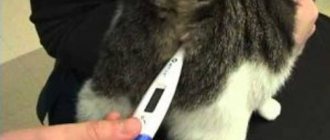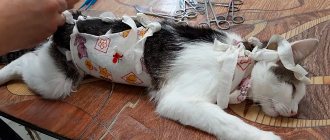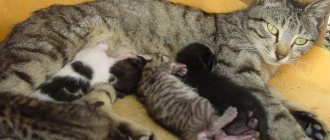Just like people, cats have different personality traits. One of them is jealousy—or at least what looks like jealousy. In fact, it's probably your pet that is exhibiting some aggressive, competitive, or hierarchical tendencies in an attempt to get what it wants, whether it's a favorite toy or extra scratches on its head.
Jealous cats often crave attention and are more affectionate than reserved cats, and can sometimes act out. Although it can be frustrating, there are steps you can take to stop jealous behavior. The key is to try to understand why your cat feels this way.
How to overcome jealousy in cats
Of course, many readers, after reading the title, were incredibly surprised.
Yes, even tailed animals can be jealous! How does jealousy manifest in cats? About the same as with you and me. There are people who are naturally jealous and demand from their loved ones that all attention be paid exclusively to them. There are also people, let’s say, who are not very jealous. If something happens, they will worry in some distant corner... They will definitely not create scenes of jealousy! Much the same thing happens with cats. Why are cats jealous?
Jealousy on the part of a cat can most often be noticed when there are several pets in the house. Especially cats! It often comes, in the literal sense of the word, to military action.
Jealousy often arises due to mistakes in the socialization of the kitten. The baby becomes painfully attached to its owners and falls into a state of stress with any change in the environment. For example, a new family member appears - and such a pet becomes impossible to recognize. Jealousy is also caused by the basic lack of personal space—your own corner (hidden place) where you can be alone with yourself and feel completely safe. The above becomes especially relevant when there are several pets in the house.
What factors arouse feelings of jealousy in cats?
The appearance, as noted above, of a new family member (newborn baby), sudden changes in your diet schedule, your excessive passion for social networks and games on your smartphone, simply ignoring your pet, and much more. A different situation is possible: they played and played, hugged and kissed with their pet, and at one fine moment all this stopped. For various reasons. The consequence is jealousy, bewilderment...
How to recognize that your pet is jealous?
You know your pet better - he can growl, hiss, and finally rush at the “offender.” Do you like to be stuck on your phone? The cat is able to deal with him too - some readers report that the “jealous” simply knocked the gadgets out of their hands with their paws. The situation is even worse with a newborn - after all, the baby needs to be rocked and lulled to sleep. And the cat is right there, craving attention!
Note that now we were talking about “mild” cases. But jealousy is a terrible feeling. A cat can go to great lengths: show aggression, demonstrate “destructive” behavior patterns. The most typical pattern is that the pet stops using the litter box and starts leaving “marks” everywhere. We know of cases where cats urinated demonstratively in front of their owners. Jealousy too! There are also more advanced options: a thing or object that is often used by the object of jealousy is “spoiled.” Textbook slippers, shoes, baby bassinets - the list goes on.
We often talk about behavioral disorders in cats - tailed cats scratch, tear wallpaper and curtains. Sometimes the reason is simple - jealousy, coupled with lack of attention. So, once you find your favorite cup or vase broken, carefully go over in your memory all the circumstances of what happened!
How to stop a cat from being jealous?
We will not report anything fundamentally new now. First of all, you need to get to the bottom of the cat’s “wrong” behavior - how and where it all started. What exactly served as the trigger, the trigger? Having found out the truth, you can begin to “correct”.
The easiest way out of the situation is to still find time for joint activities and games with your pet. Buy new toys, the same laser pointer. The most primitive games like a candy wrapper on a string are also suitable. At the end of the game, be sure to pet your furry friend and give him a treat.
How to find time? If you really want it, it’s simple. Develop a ritual: when you return from work, undress, put on a “homey” appearance and immediately pet your pet! Five minutes, and both of you will enjoy it!
Do you have several pets? We recommend using the “positive associations” method. Give encouragement when all the cats get together; combine them with some exciting big game. Don't skimp on treats - let there be enough for everyone. Maintain a friendly atmosphere, communicate, “talk” with your cats.
Much the same can be said when a cat is jealous of an infant. Affection, care, attention will help. And some treats!
In conclusion, we note: yes, jealousy is a terrible feeling. Jealousy consumes, corrodes, oppresses... But there is good news: it really can be cured! There are simply no unsolvable problems!
Original:
How to Solve Jealousy in Cats. Source: thesprucepets.com
Where are dogs' belly buttons?
How to make friends between a cat and a dog? Why does a hedgehog laugh? The entire encyclopedia about animals is on our website.
Source
Why and why is the cat jealous?
Each cat has its own unique character, and some cats are also capable of jealousy. They show this feeling in different ways, but it is important not only to know how to recognize cat jealousy, but also to be able to deal with it.
The cat is jealous of the laptop
Why is the cat jealous?
Here their behavior can resemble human behavior; when the owner pays more attention to someone else, cats can become jealous. A cat overwhelmed by jealousy requires more attention and therefore becomes more intrusive and “clingy.”
Conditions under which the cat becomes more dependent on you, an unexpected change in the surrounding space, as well as the appearance of a new family member can provoke envy in the pet.
Especially if the animal does not have its own personal space, sleeping place, or toys. Or your kitty will become suspicious of the threat of oppression by another family member.
For example, a cat may change if a newborn baby arrives in the family, a change in the cat's diet, or even if you pay more attention to the phone and computer. If a cat sees that they are playing with it less, it will become jealous.
Iberia is suffering
But it turns out that I wasn’t the only one who didn’t like this turn of events. At first we noticed that the food in Iberia’s cup was not decreasing and the meat delicacies, which she had recently never tired of begging for, were drying up untouched.
Moreover, the cat stopped reacting not only to the beeping of the intercom, but also to the noise of the opening door - no one met anyone anymore. She refused to lie on the sofa, as before, and sat on the windowsill all day and looked out the window. Her sides were sunken, her fur stopped shining and became matted, and the tufts on her ears drooped. When they tried to pet her, she ran away and turned away from her favorite toys.
She is jealous? Can a cat have human emotions? But the very first forum I found on the Internet told stories that made me freeze in horror, realizing that Iberia did not have long to live. People regretted that they had recklessly got new pets and thus doomed the old ones to suffering.
How to make friends between a cat and a kitten: ways to reconcile pets
Adult cats are capable of expressing their feelings and character. By its nature, it is a solitary animal, which often finds it difficult to find a common language with other pets and sometimes it is difficult for the owner to make friends between an adult cat and a female cat. This feature of cat behavior should be taken into account if a decision has been made to bring home a new family member - a small kitten. An adult may show aggression towards a kitten. Therefore, it is important to know why this aggression occurs and how to make friends between a cat and a kitten in the future.
Competition or stress?
A cat's aggressive or negative behavior is most often caused by competition for territory, food, or even human attention. However, in many cases, negative behavior is caused by stress due to some change in their life. The sudden appearance of a new neighbor or family member can be frightening for your cat. Perhaps the appearance of a child, another cat, dog, etc. in the family. it simply scared the tailed family member and the aggression or resentment is not related to competition for resources. There is no need to draw premature conclusions. Try to figure it out and find the reason.
Let's look at cases that people often ask about.
Causes of aggressive behavior
A cat or cat can behave aggressively for various reasons. But no matter what provokes your pet’s anger, you need to find your own approach to it and make every effort to suppress this anger.
You can make friends between an adult cat and a kitten if you know some rules and tricks
There are several reasons why cats do not accept babies into the house. And each of them has its own natural explanation.
Important! The ideal age for an adult cat to introduce him to a small kitten is up to three years old. The older the animal, the more difficult it will be to make friends with them.
Threat
An adult animal may see a potential threat in a small kitten.
Cats do not understand situations, so with any changes in their lives, they feel a real danger, thus protecting their lives. In such cases, they prefer to attack first, and then realize the essence of what is happening. The model of this behavior is clearly visible when cats attack dogs if the latter appear suddenly. Moreover, the size of the dog does not matter. The same thing happens when meeting a kitten.
Important! The cat will attack first and then take a closer look.
A cat may see a small kitten as a potential threat to its life.
The cat may also perceive a threat in the appearance of a small relative in terms of territory. If a strange animal enters a house where the pet has always felt like the sole owner, it becomes overwhelmed by a sense of potential danger. Therefore, manifestations of aggression cannot be avoided.
Jealousy
Jealousy is not unique to humans. Animals also actively demonstrate it.
Moreover, cats can be jealous of anyone: be it the owner’s husband or wife, a newborn child, or just a stranger. Aggressive behavior against a background of jealousy often manifests itself in relation to another animal.
As a rule, people give a small kitten much more attention and love, play with it more, and pick it up. This is what causes hostility towards the baby.
An adult cat begins to actively fight injustice and try to return all the love of its owner to itself. Most pets are possessive and find it very difficult to accept the presence of a new pet next to their adored owner.
Cats are very jealous creatures
Other causes of aggression
Other factors can also lead to aggression:
- predator instinct;
- revenge for the offense caused by the owner;
- severe pain;
- hormonal changes leading to mood changes;
- unsatisfied sexual libido;
- protecting your own kittens.
Cats are predators. The arrival of a small kitten can awaken this primal instinct in them. They won't eat it, but they can start playing rather cruel games with it. Often the cat imitates hunting - it tracks the kitten, sneaks up on it and attacks.
Interesting research
No restrictions and stereotypes: how the choice of toys affects future maturity
Someone plants flowers in pots, and I plant pumpkins. Easy way
Frolics when meeting: the actions of dogs that people misunderstand
In 2014, researchers at the University of California, San Diego modified experiments on children to include man's best friend, the dog.
They found that the four-legged friends showed a high degree of jealousy when their owners interacted with the fake dog, petting it and viewing it as if it were real. A third of dogs tried to get between their owners and a fake animal, and one in four even tried to bite a fake dog.
According to the researchers, those dogs that didn't show jealousy may have realized that the stuffed animals weren't real dogs, or they didn't have very strong bonds with their owners.
So characteristic
There are cats that greet newcomers very negatively and categorically do not want to be friends with them. If this is natural in the pet’s character, then one can hardly expect that she will welcome the kitten with open arms. In the end, she feels like a mistress - strong and independent.
There are quite peaceful cats. They get along with the kids quickly and accept them peacefully.
There are independent ones. They will likely tolerate the kitten, but will keep it at a distance. It is quite possible that the small one's constant attempts to communicate will eventually lead to the fact that adult cats will begin to treat him condescendingly and even patronize him.
How to help animals make friends
How to make friends between a cat and a dog: options for reconciling pets
How to make friends between a cat and a kitten without stress and hurting each other? Friendship between an adult cat and a kitten is a matter of time. The result of their meeting and long-term hostility may be unexpected.
Sometimes the cat immediately accepts the kitten as if it were her own baby and comes to its defense. A cat may show sexual attraction to him if the owner has not resorted to castration.
But most often, without human help, friendship or at least acceptance does not arise. Therefore, the owner of an adult animal should learn simple reconciliation techniques and stock up on good patience. You can learn from your own experience how to introduce a cat to a kitten.
The process is gradual and consists of several steps:
- Maintaining personal space.
- Accustoming a kitten to its litter box and bowl.
- Sniffing at first meeting.
- Cooperative games.
- Gradually bringing bowls closer together during meals.
- Equal attention from the owner to all pets in the house.
A cat's first reaction to a strange kitten is hissing.
Personal space
First of all, a cat perceives a small cat as a contender for their territory. The owner's job is to change this perception.
The animal must realize that the kitten is not an invader and does not claim its space. During the first days, the baby should be isolated in another room and not allowed to cross paths with the cat. The kitten must be provided with its own bowl, bed and tray.
Attention! Many adult pets abandon their usual litter boxes and begin to relieve themselves throughout the apartment if their toilet has been marked by someone else's animal.
After a few days, when the cat has learned to eat from her bowl, go to her litter box and sleep on her bed, she can be released into the common room for a short time. This will begin the gradual acquaintance of the pets, which will be the first step towards their living together.
Acquaintance
The first acquaintance of animals occurs through smells. Even a kitten locked in another room is perfectly felt by a cat. The newcomer emits odors that are keenly detected by other pets. The cat will come to the door, sniff it, and maybe even ask to go into that room.
In such a situation, it is better to ignore her meowing and not let her into the room with the kitten. This can result in attack and aggression. After a few days, the cat will get used to the new smell, which will help the personal acquaintance be more calm and restrained.
The cat first sniffs the kitten for a long time, then can accept it
The first meeting between a kitten and an adult animal should take place under the control of the owners. It is possible that there may be a manifestation of temperament and an unpredictable reaction to the baby. Sometimes the meeting ends with curiosity and friendliness. But most often the kitten is faced with indifference or aggression. The owner must be alert and have time to protect the baby.
A warning hiss from a cat is considered normal in such a situation. It's part of watching each other. It is better if this happens at a safe distance.
If you try to attack, scratch or bite a kitten, the acquaintance should be stopped - it is better to do this right away. You can continue the meeting the next day and repeat this until the relationship becomes friendly. The owner himself will not notice how he managed to accustom the cat to the kitten.
Important! Not every kitten can become a victim of aggression. There are cases when an adult cat needs help and protection. A hyperactive child, without a sense of fear, can besiege the animal and not allow it passage. The owner must maintain a balance between them.
Attitude towards two animals in the house
A natural situation is when a cat offends a kitten, and a person tries to protect it. Under no circumstances should she be punished for this. The cat experiences stress and fear from the appearance of a stranger. The animal is not social, so its behavior is guided by natural instincts. Instead of punishing your pet, it is better to treat your pet with a treat and involve him in the game. The animal will calm down and become more friendly.
Preparation - and jealousy is not scary!
Cats who have undergone major changes in their lives are usually jealous. Therefore, to prevent such a reaction, do not change the pet’s existing status quo. After all, maybe you forgot, but ko6e4ka.ru will remind you: the owner for a cat and a dog are different personalities. The cat does not perceive itself as your servant, which cannot be said about the dog. On the contrary, it is you who live in his apartment. And by what you call jealousy, the cat expresses its “finess.” As if he were hinting: “Dude, it’s time for you to live separately!” These are all jokes, but they contain an important truth: a representative of the proud feline family imagines himself as royalty, to whom everyone must be subordinate. And first of all, a beloved hostess.
What to do so as not to disturb your pet? Here it is also important to indicate not only what, but also when.
Negotiation table - what to do with aggression?
When animals show aggression, you should never physically punish them, but, of course, you need to scold them. Slapping the tail or flicking the nose is strictly prohibited. But experts recommend distracting the cat and scaring it with a sharp clap or water.
When the owner notices that the cats, instead of fear and aggression, begin to show interest in each other, showing a friendly attitude, they need a few more days - optimally 10-14 - to keep them in isolation and then release them.
Under no circumstances should you allow your baby to bother your cat. Otherwise she will get irritated.
Ways to reconcile pets
The reaction of a cat and a female cat to the appearance of a small foreign kitten in the house is often different. A cat shows aggression for one reason; for a cat, these motives may differ.
How to accustom a kitten to your hands: reasons for fear and methods of training
But their hostility is united by one fact - they are inveterate loners and they extremely dislike unwanted neighbors. The owner of animals should remember that different causes of aggression require different ways to solve them. Let's take a closer look at how to reconcile a kitten with a cat and a male cat.
Friendship between cat and kitten
It is somewhat easier to make friends with a kitten than a mature cat.
Many owners believe that when a cat meets a baby, its maternal instinct can awaken. Sometimes this happens. The animal accepts the new family member as its own child, but this rule can only work if the cat is currently nursing, or has recently lost its kittens.
In a fit of longing for her babies, she perceives someone else's kitten as her own. Although such cases are possible with non-lactating females. But most often the brought baby is perceived as an adult animal that poses a threat to her life and it will not be possible to reconcile them at first.
Attention! To reconcile them, the kitten should be shown to the cat gradually.
First, they should be isolated from each other. Let her get used to his smell. Then try to introduce them. The cat will sniff it carefully and consider whether it is dangerous to its life.
Playing together, not punishing aggression, separating bowls and trays will do the trick - after a while the cat will accept the kitten, if not as her baby, but as a safe friend.
A mature cat may show inappropriate sexual attraction to a kitten. This occurs due to the smell emitted by the baby, a hormonal surge due to unsatisfied sexual needs. In such a situation, the animal should be sterilized.
When a cat meets a kitten, its maternal instinct may awaken
Reasons for a cat hissing at its owner
Domestic cats are usually expected to be fairly friendly and not show aggression towards their owner. But sometimes there are times when a pet starts hissing for no obvious reason. Why does he do this:
Read also: Hairstyles for girls
- the pet was recently taken from other owners, and he did not have time to get used to new people;
- the owner’s behavior has changed dramatically, or unfamiliar odors are emanating from him. Often this reaction occurs when returning from vacation or a business trip;
- addition to the family. The cat may be jealous of the owners for the new family member or perceive the child as a threat;
- deliberate attempts to anger the cat. If a cat is constantly pulled by the tail, disturbed and teased, he will get used to constantly hissing at people;
- the cat was temporarily given to relatives and then taken back. A change of environment is stressful for the animal. In addition, the cat feels abandoned and hisses to express resentment towards the owner.
In order not to spoil the character of your domestic cat, there is no need to make her worry again. The life of an animal should be measured and stress-free.
Most often, cats show aggression towards other people's kittens, but sometimes they hiss at their own:
- In this way, the cat tries to calm the kittens and let them know that they need to be quieter. This often happens at a time of danger, when attention cannot be attracted;
- the cat teaches little kittens aggressive behavior so that in the future they will be able to stand up for themselves;
- If the kitten's scent seems foreign, the mother will hiss at it. This happens when people start picking up animals too early;
- if the baby is too weak, the mother will hiss to drive it away from the milk so as not to waste energy on it. This is how natural selection works;
- a cat will hiss at her kitten if he bites her painfully while feeding;
- When there is no milk, the cat hisses to let him know that he should not be disturbed.
We suggest you familiarize yourself with Ants in the house - why they appear and how to get rid of them once and for all
Can a cat be jealous?
When people talk about cat jealousy, they usually ask questions like these:
- “Did the cat pee on the bed because she was jealous of my new boyfriend?”
- “My cat attacks another cat because he is jealous?”
- “Is my cat hissing at my baby because she is jealous?”
Let's define what jealousy is in general? Jealousy is most often called a hostile emotion associated with some kind of (not necessarily real!) superiority . We humans often experience feelings of jealousy and more or less understand it. In some cases, this can even be a good thing: jealousy can motivate us to work harder to achieve success. However, jealousy is also known as the "green-eyed monster" and it can lead to terrible things. This is a difficult emotion to experience and involves many conflicting feelings and thoughts.
The cat world is much simpler. Cats definitely don't experience jealousy in the human sense of the word. However, when pets feel superior to another family member, they may behave negatively. And this can, with a stretch, be called cat jealousy.
The cat peed on... - he is jealous of...
When a pet pees on any object or in a certain place, thoughts immediately appear that the pussy is doing this out of anger or jealousy.
Did the cat pee on my boyfriend's shoes? She's jealous of him! Did the cat pee in the baby's crib? This is jealousy! Did kitty do business in my bed? She is jealous of the new cat who sleeps there.
You will be disappointed, but this is not how cats show their jealousy.
A cat may pee outside the litter box for various reasons, but “punishing” a person is not one of them. In many cases, this is due to illness or stress, but often the problem is difficult to diagnose without a visit to the veterinarian. Another explanation for this behavior may be the inconvenient location of the tray. Tags children dog











